Related Research Articles

The University of California, San Francisco (UCSF) is a public land-grant research university in San Francisco, California. It is part of the University of California system and is dedicated entirely to health science and life science. It conducts research and teaching in medical and biological sciences.
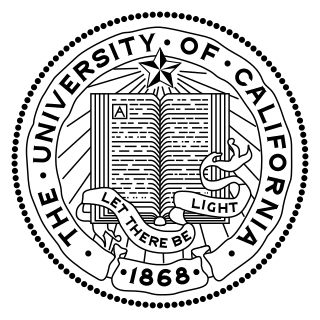
The University of California (UC) is a public land-grant research university system in the U.S. state of California. Headquartered in Oakland, the system is composed of its ten campuses at Berkeley, Davis, Irvine, Los Angeles, Merced, Riverside, San Diego, San Francisco, Santa Barbara, and Santa Cruz, along with numerous research centers and academic abroad centers. The system is the state's land-grant university. Major publications generally rank most UC campuses as being among the best universities in the world. In 1900, UC was one of the founders of the Association of American Universities and since the 1970s seven of its campuses, in addition to Berkeley, have been admitted to the association. Berkeley, Davis, Irvine, Los Angeles, Santa Barbara, and San Diego are considered Public Ivies, making California the state with the most universities in the nation to hold the title. UC campuses have large numbers of distinguished faculty in almost every academic discipline, with UC faculty and researchers having won 71 Nobel Prizes as of 2021.

The University of California, Berkeley is a public land-grant research university in Berkeley, California. Founded in 1868 and named after Anglo-Irish philosopher George Berkeley, it is the state's first land-grant university and the founding campus of the University of California system. Berkeley is also a founding member of the Association of American Universities. It has been regarded as one of the top universities in the world.

The University of California, Davis is a public land-grant research university in Davis, California, United States. It is the northernmost of the ten campuses of the University of California system. The institution was first founded as an agricultural branch of the system in 1905, known as University Farm, and became the seventh campus of the University of California in 1959.

The University of California, San Diego is a public land-grant research university in San Diego, California, United States. Established in 1960 near the pre-existing Scripps Institution of Oceanography, UC San Diego is the southernmost of the ten campuses of the University of California, and offers over 200 undergraduate and graduate degree programs, enrolling 33,096 undergraduate and 9,872 graduate students. The university occupies 2,178 acres (881 ha) near the coast of the Pacific Ocean, with the main campus resting on approximately 1,152 acres (466 ha).
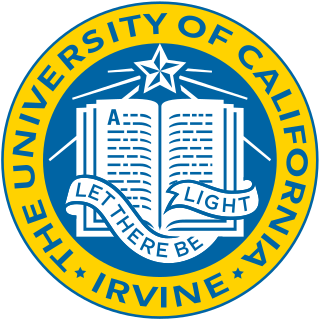
The University of California, Irvine is a public land-grant research university in Irvine, California. One of the ten campuses of the University of California system, UCI offers 87 undergraduate degrees and 129 graduate and professional degrees, and roughly 30,000 undergraduates and 6,000 graduate students were enrolled at UCI as of Fall 2019. The university is classified among "R1: Doctoral Universities – Very high research activity" and had $523.7 million in research and development expenditures in 2021. UCI became a member of the Association of American Universities in 1996.

The California State University is a public university system in California, and the largest public university system in the United States. It consists of 23 campuses and seven off-campus centers, which together enroll 457,992 students and employ 56,256 faculty and staff members. In California, it is one of the three public higher education systems, along with the University of California and the California Community Colleges systems. The CSU system is officially incorporated as The Trustees of the California State University, and is headquartered in Long Beach, California.
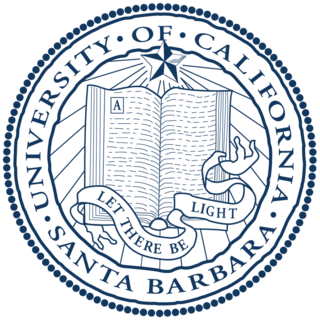
The University of California, Santa Barbara is a public land-grant research university in Santa Barbara County, California, United States. It is part of the University of California university system. Tracing its roots back to 1891 as an independent teachers' college, UCSB joined the ancestor of the California State University system in 1909 and then moved over to the University of California system in 1944. It is the third-oldest undergraduate campus in the system, after UC Berkeley and UCLA. Total student enrollment for 2022 was 23,460 undergraduate and 2,961 graduate students.
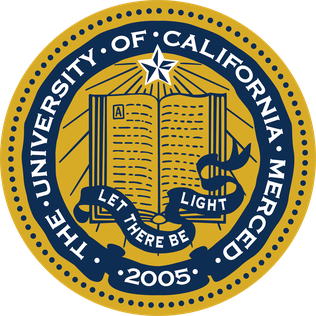
The University of California, Merced is a public land-grant research university in Merced, California. It is one of the ten campuses in the University of California (UC) system. Established in 2005, UC Merced is the newest campus within the UC system. The primary campus is located around five miles north of Merced and sits adjacent to Lake Yosemite. The main campus is around 1,026 acres in size, and total land owned by the university amounts to around 8,195 acres including large areas of preserve land. Large swaths of almond orchards and natural grasslands surround the university.

Proposition 209 is a California ballot proposition which, upon approval in November 1996, amended the state constitution to prohibit state governmental institutions from considering race, sex, or ethnicity, specifically in the areas of public employment, public contracting, and public education. Modeled on the Civil Rights Act of 1964, the California Civil Rights Initiative was authored by two California academics, Glynn Custred and Tom Wood. It was the first electoral test of affirmative action policies in North America. It passed with 55% in favor to 45% opposed, thereby banning affirmative action in the state's public sector.

Nicholas B. Dirks is an American academic and a former Chancellor of the University of California, Berkeley. Dirks is the author of numerous books on South Asian history and culture, primarily concerned with the impact of British colonial rule. In June 2020, Dirks was named president and CEO of The New York Academy of Sciences.
Nelson Woolf Polsby was an American political scientist. He specialized in the study of the United States presidency, the United States Congress and how governmental policies and practices evolve.
The Florida State University College of Social Sciences and Public Policy, located in Tallahassee, Florida, is one of fifteen colleges comprising Florida State University (FSU). The college was founded in 1973 and includes six departments: Economics, Geography, Political Science, Sociology, Urban and Regional Planning and the Askew School of Public Administration and Policy and interdisciplinary programs in African American Studies, Demography, International Studies, Interdisciplinary Social Science, and Public Health.
Peter D. Hart is the chairman of Peter D. Hart Research Associates since 1971, and is a senior counselor to TMG Strategies. Together with Robert Teeter or Bill McInturff, Hart and his company have provided NBC News and The Wall Street Journal with polls since 1989. More than 40 U.S. senators and 30 governors, among them Hubert Humphrey, Lloyd Bentsen, Jay Rockefeller and Bob Graham, have been represented by Hart Research.

The School of Social Ecology (SSE) is a school at the University of California, Irvine (UCI) that focuses on social ecology. Students in SSE at UCI undergo a multidisciplinary program that examines real-world social and environmental issues, involves the students in off-campus internships and SSE offers undergraduate and graduate degrees, including bachelor's, professional master's, and Ph.D.s.
Bruce E. Cain is a professor of political science at Stanford University and director of the Bill Lane Center for the American West. Cain's fields of interest include American politics, political regulation, democratic theory, and state and local government. He has written extensively on elections, legislative representation, California politics, redistricting, and political regulation. In addition to his academic work, Cain frequently is quoted in national and international media, and regularly appears as a political expert for KGO-TV in the San Francisco Bay Area. He is a member of the American Political Science Association, and serves on the editorial boards of Election Law Journal and American Politics Research. Cain has been a member of the American Academy of Arts and Sciences since 2000. During AY 2012–13, Cain will serve as a Straus Fellow at New York University's Straus Institute for the Advanced Study of Law and Justice.
The history of the University of California, Berkeley, begins on October 13, 1849, with the adoption of the Constitution of California, which provided for the creation of a public university. On Charter Day, March 23, 1868, the signing of the Organic Act established the University of California, with the new institution inheriting the land and facilities of the private College of California and the federal funding eligibility of a public agricultural, mining, and mechanical arts college.
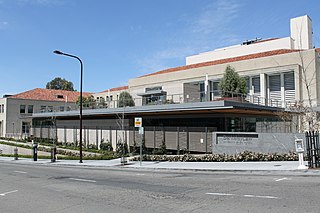
The University of California, Berkeley School of Law is the law school of the University of California, Berkeley. The school was commonly referred to as "Boalt Hall" for many years, although it was never the official name. This came from its initial building, the Boalt Memorial Hall of Law, named for John Henry Boalt. This name was transferred to an entirely new law school building in 1951 but was removed in 2020.
Jack Citrin is an American political scientist. He is the director of the Institute of Governmental Studies and a professor emeritus of Political Science at the University of California, Berkeley. He is the co-author and co-editor of several books about national identity and tax resistance.

Proposition 16 is a California ballot proposition that appeared on the November 3, 2020, general election ballot, asking California voters to amend the Constitution of California to repeal Proposition 209 (1996). Proposition 209 amended the state constitution to prohibit government institutions from considering race, sex, or ethnicity, specifically in the areas of public employment, public contracting, and public education. Therefore, Proposition 209 banned the use of race- and gender-based affirmative action in California's public sector.
References
- ↑ Institute of Governmental Studies. "A Timeline of IGS History from 1919-1995". Archived from the original on June 11, 2010. Retrieved May 14, 2012.
- 1 2 Vieg, John A. (1955). "Two Men and Two Institutions: The Lengthening Shadows of Samuel C. May and Emery E. Olson". Public Administration Review. 15 (4): 244–246. doi:10.2307/972977. JSTOR 972977.
- ↑ "UC Berkeley". Vcresearch.berkeley.edu. Archived from the original on June 9, 2010. Retrieved January 16, 2019.
- ↑ "Home". Bepress.com. Retrieved January 16, 2019.
- ↑ "IGS goes Web 2.0 with information resource on state propositions". Archived from the original on June 1, 2010. Retrieved August 6, 2010.
- ↑ "University of California: In Memoriam, 1987". Content.cdlib.org. Retrieved January 16, 2019.
- ↑ "Eugene C. Lee - Institute of Governmental Studies - UC Berkeley". Igs.berkeley.edu. October 2, 2012. Retrieved January 16, 2019.
- ↑ Bernstein, Adam (February 8, 2007). "Nelson W. Polsby, 72; Explained Change in Political Institutions". The Washington Post .
- ↑ "About IGS - Institute of Governmental Studies - UC Berkeley". Igs.berkeley.edu. October 19, 2011. Retrieved January 16, 2019.
- ↑ "Jack Citrin - Institute of Governmental Studies - UC Berkeley". Igs.berkeley.edu. July 31, 2012. Retrieved January 16, 2019.
